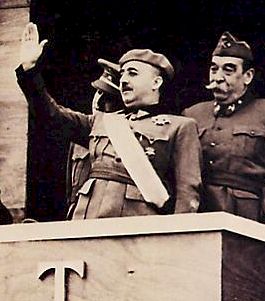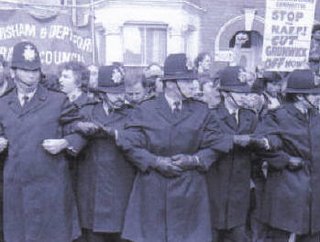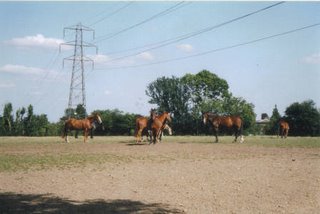A disproportionate attack, considering Labour's disgraceful policy
 BEIRUT. Should we have worried about wrong slogans damaging the "peace process"?
BEIRUT. Should we have worried about wrong slogans damaging the "peace process"?THANKS to the wonders of modern media I was able to watch and listen to some of the Labour Party conference in Manchester live last week. Thanks to the dumbing-down policy of the BBC
I had to do so on my PC, viewing their specialist parliament channel, because the public service broadcaster thinks the public should only be interested in housebuying, snooker, cooking and car boot sales, and if a few of us oddballs want to watch what is happening in political parties, the TUC or the mother of all parliaments we ought to go to a specialist channel.
Anyway, as luck would have it, who should come to the rostrum while I was watching but Neil Nerva, briefly a councillor in Brent, but speaking for "the Jewish Labour Movement". If this conveys pictures of heroic underground struggle in Tsarist Russia and occupied Europe, or the battle to organise in immigrant sweatshops, forget it. "The Jewish Labour Movement" is the name the Zionist party within Labour which used to be called Poale Zion has misappropriated for itself to fool the unwary and claim a status it does not deserve. But let's give them a hearing.
Neil spoke about how disgraceful it was that "members of the left marched through London chanting 'We are all Hizbollah'", during Israel's war in Lebanon. "Do they know what Hezbollah is? Do they know what it stands for? Do they think such behaviour aids the peace process?"
Peace process? Israeli forces were bombing residential areas of Beirut, destroying bridges and power stations and attacking refugee columns, and we should have worried whether the wrong slogans chanted in London might endanger "the peace process"?
As Neil knows perfectly well what used to be called the "peace process" was halted some time ago, while President Arafat was still alive, when Israel stopped talking and laid siege to the Palestinian leader in his compound. Since then Ehud Olmert has declared that the so-called "security" wall - cutting deep into Palestinian territory, separating villagers from their land, and carving what is left of Palestine into embattled enclaves - would be Israel's final border. Hardly an earnest for a genuine "two-state solution".
Israel has imposed siege conditions on Gaza, and cut of the Palestinian Authority's funds with British, US and EU support, causing poverty and hunger. The Israeli government refused to negotiate over the capture and exchange of prisoners, preferring to bomb Gaza's infrastructure and essential services, bringing immense suffering on ordinary Palestinians, particularly the young, the sick and old. It is holding elected Palestinian leaders captive.
The Hizbollah operation against Israeli forces in the Shaba Farms area may have been intended to relieve pressure on Palestinians in Gaza. Once again Israel could have sought to negotiate, but instead took it as pretext for a pre-planned all-out attack on Lebanon, probably with US encouragement. It was after Israeli planes bombed Beirut airport that Hizbollah resumed rocket attacks on Israel, which had not happened in over a decade. "Hizbollah launched rockets into civilian areas from civilian areas", Neil Nerva claimed, "Communities in both northern Israel and southern Lebanon found themselves spending a month in bomb shelters".
I doubt whether rockets were launched from amid tower blocks in Beirut's streets, hardly the easiest place to manouvre a rocket launcher to take aim and withdraw, as would make sense. I don't know how well such missiles can be aimed. Certainly they seemed to strike not strategic targets but working-class districts in Haifa and Palestinian towns and villages, such as Deir Al Assad. These places were not provided with shelters, and now they are also being denied compensation to rebuild.
All the time that people were suffering and dying in this unnecessary war British media kept saying that Israel was "making war on Hizbollah". Labour's Foreign Secretary Margaret Beckett stood with Condoleeza Rice and the Israeli government against any cease-fire, and British airfields (including the civilian Preswick airport) were used to rush US munitions to Israel, including bunker busting bombs such as caused the death of civilians including children sheltering at Cana, on July 30.
As Dave Rosenberg of the Jewish Socialists' Group told the London demonstration on July 22,
"You do not have to share or support the ideas of Hamas of Hezbollah to say that the bombardment of civilians is wrong, detention without trial of thousands of Palestinians is wrong, discrimination between Jews and non-Jews in Israel is wrong, or to say that the Israeli government should negotiate with the democratically elected Palestinian government, which means: negotiate with Hamas"
(see full speech and more about Jewish Socialists' Group).
I wasn't chanting "We are all Hizbollah" on that demonstration, nor were most people. But I can understand the temptation that Lebanese and other Arabs and sympathisers felt to do so, seeing what was happening, and the way Israel and its media supporters pretended it was only fighting "the terrorists". Whatever we think of Hizbollah's ideas or misguided missiles, the Lebanese resisters of whatever ideology deserve respect for putting up a better and braver fight against Israeli invasion than any Arab regime has ever done.
For George Galloway or his supporters to attempt to bask opportunistically in its glory is less impressive. But was this the most disgraceful thing happening?
Neil Nerva was speaking at the annual conference of the British Labour Party, the party of Blair and Margaret Beckett. The society for which he was speaking is also linked with the Israeli Labour party, and used to tell everyone how Israel's nuclear programme launcher Shimon Peres was the best hope for Middle East peace. Former Labour leader Peres joined Kadima, and his successor Amir Peretz dashed hopes that he would be a peacenik by becoming Olmert's Defence Minister before this war.
Ex-MP Reg Freeson, Neil Nerva's colleague in Brent East Labour Party and in Poale Zion- the Jewish Labour Movement, wrote in the latter's Jewish Vanguard of both Hamas-Hizbollah and Israeli aggression, saying Jewish people were horrified by the killing of civilians, and condemning US-UK backing for the war and opposition to a cease fire. (A Wicked Summer Too Far, Jewish Vanguard http://www.jlm.org.uk/vanguard/20060901.pdf
From what I know of Neil Nerva - and I was speaking to him at the Grunwick strike commemoration only the other week - I would not have expected him to be more right-wing than Reg Freeson, even if obviously he would not agree with myself. Both Neil and his father, former Poale Zion chair Laurie Nerva, were signatories to Jews for Justice for Palestinians, which has been taking some stick from pro-war Zionists.
There was a fair amount of applause for Neil Nerva's speech when he attacked those who had disgraced themselves by shouting for Hizbollah. I hope Labour delegates concerned that opposition to aggression should have had the correct policy and slogans will ask why they were not allowed to discuss any of the resolutions on Lebanon that were submitted to their party conference.
By all means criticise people and slogans in the solidarity and anti-war movements, but if you are speaking at a Labour Party conference there are surely more deserving targets to aim for. Otherwise your attack too becomes misguided and disproportionate!
Labels: Labour Party, Zionists












